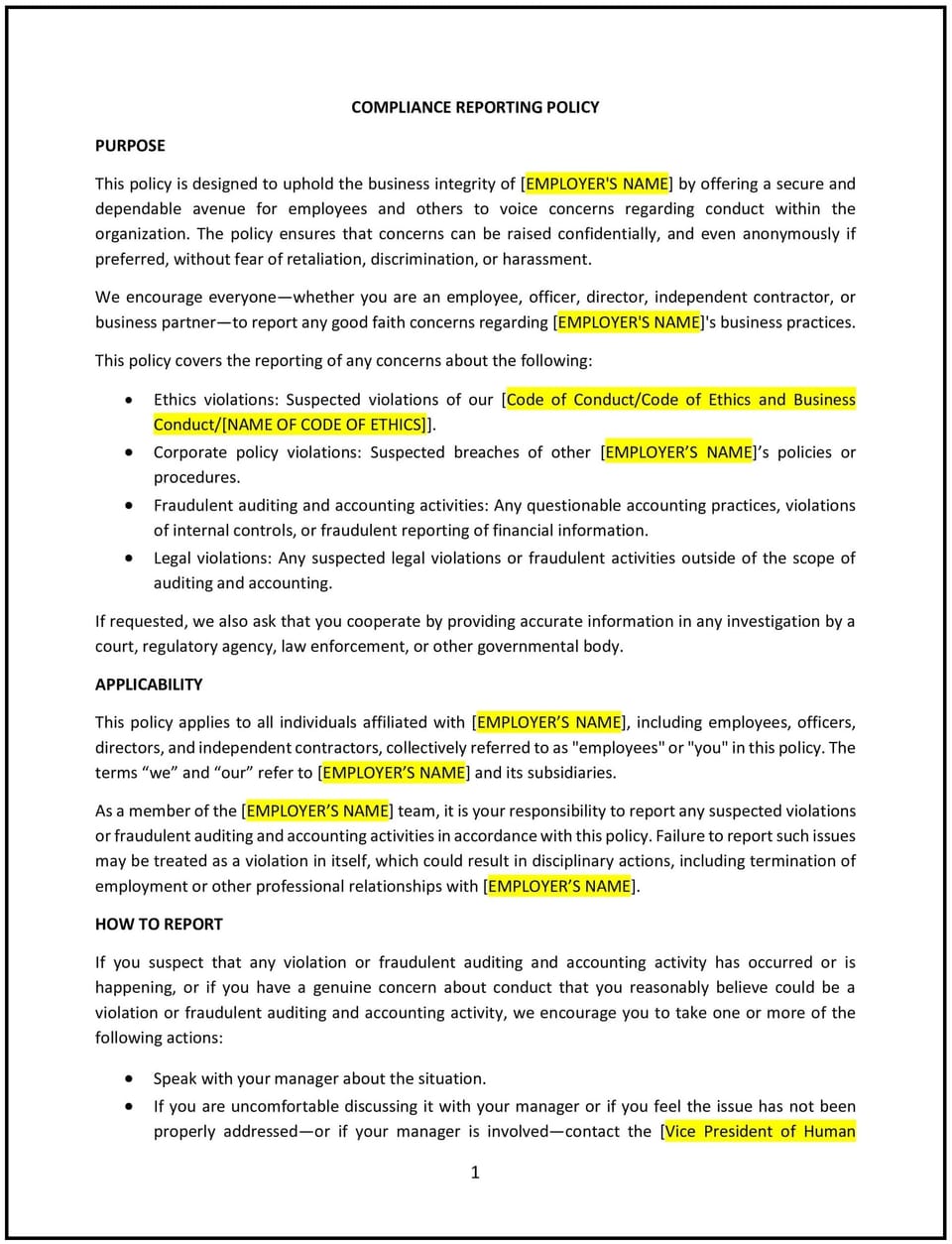Compliance reporting policy (Hawaiʻi): Free template

Compliance reporting policy (Hawaiʻi)
A compliance reporting policy helps Hawaiʻi businesses establish a structured process for employees to report potential violations of laws, regulations, or internal policies. This policy outlines reporting mechanisms, protections for whistleblowers, and procedures for investigating and addressing reported issues. It is designed to promote transparency, accountability, and ethical behavior while addressing Hawaiʻi-specific legal and cultural considerations.
By implementing this policy, businesses in Hawaiʻi can foster a culture of integrity, reduce legal and reputational risks, and demonstrate a commitment to ethical practices.
How to use this compliance reporting policy (Hawaiʻi)
- Define reportable issues: Specify the types of concerns employees can report, such as fraud, safety violations, harassment, or unethical behavior.
- Establish reporting channels: Provide multiple avenues for employees to report concerns, such as a dedicated hotline, email, or in-person reporting to a designated compliance officer.
- Ensure confidentiality: Protect the identity of whistleblowers and maintain the confidentiality of reported information to encourage open communication.
- Prohibit retaliation: Clearly state that retaliation against employees who report concerns in good faith will not be tolerated.
- Outline investigation procedures: Provide steps for investigating reported issues, including timelines, documentation requirements, and involvement of relevant stakeholders.
- Communicate the policy: Share the policy with employees during onboarding and through regular reminders, such as emails or training sessions.
- Train employees and managers: Educate employees on how to report concerns and train managers on handling reports appropriately.
- Review and update the policy: Regularly assess the policy’s effectiveness and make adjustments as needed to reflect changes in laws, regulations, or business needs.
Benefits of using this compliance reporting policy (Hawaiʻi)
This policy offers several advantages for Hawaiʻi businesses:
- Promotes ethical behavior: A clear reporting process encourages employees to speak up about potential violations, fostering a culture of integrity.
- Reduces legal and reputational risks: Addressing issues early can help businesses avoid fines, lawsuits, or damage to their reputation.
- Protects whistleblowers: Confidentiality and anti-retaliation provisions ensure employees feel safe reporting concerns.
- Enhances transparency: A structured reporting process demonstrates the business’s commitment to accountability and ethical practices.
- Builds trust: Employees are more likely to trust leadership when they see concerns are taken seriously and addressed promptly.
- Aligns with legal requirements: The policy helps businesses meet Hawaiʻi state laws and federal regulations related to whistleblower protections and compliance.
Tips for using this compliance reporting policy (Hawaiʻi)
- Communicate the policy effectively: Share the policy with employees during onboarding and through regular reminders, such as emails or posters in common areas.
- Provide training: Educate employees on how to report concerns and train managers on handling reports appropriately.
- Ensure accessibility: Make reporting channels easy to access and use, such as a 24/7 hotline or an online reporting platform.
- Be transparent: Clearly explain the policy’s purpose, benefits, and expectations to employees to build trust and cooperation.
- Monitor and follow up: Regularly review reported issues, track investigation progress, and provide updates to employees when appropriate.
- Review the policy periodically: Update the policy as needed to reflect changes in laws, regulations, or business needs.
Q: Why should Hawaiʻi businesses adopt a compliance reporting policy?
A: Businesses should adopt this policy to promote ethical behavior, reduce legal and reputational risks, and demonstrate a commitment to accountability.
Q: What types of issues should employees report?
A: Employees should report concerns such as fraud, safety violations, harassment, or unethical behavior that may violate laws, regulations, or internal policies.
Q: How should businesses handle whistleblower confidentiality?
A: Businesses should protect the identity of whistleblowers and maintain the confidentiality of reported information to encourage open communication.
Q: What protections should businesses provide for whistleblowers?
A: Businesses should prohibit retaliation against employees who report concerns in good faith and ensure they are not subjected to adverse actions.
Q: How should businesses investigate reported issues?
A: Businesses should follow a structured process, including timelines, documentation, and involvement of relevant stakeholders, to ensure thorough and impartial investigations.
Q: What training should businesses provide to employees?
A: Businesses should educate employees on how to report concerns and train managers on handling reports appropriately to ensure consistency and fairness.
Q: How often should the policy be reviewed?
A: The policy should be reviewed annually or as needed to reflect changes in laws, regulations, or business needs.
This article contains general legal information and does not contain legal advice. Cobrief is not a law firm or a substitute for an attorney or law firm. The law is complex and changes often. For legal advice, please ask a lawyer.


